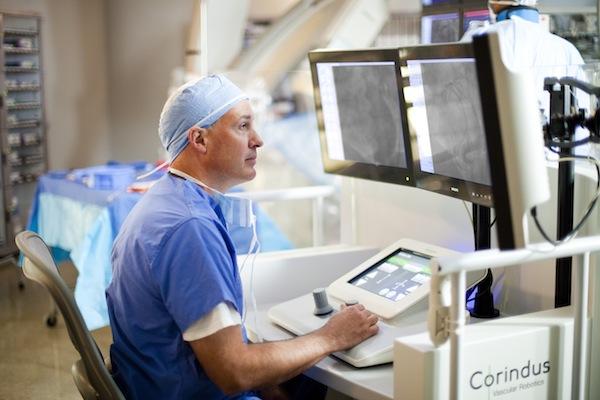
May 15, 2012 — A robotic system can safely assist interventional cardiologists in performing percutaneous coronary interventions (PCI) while significantly reducing the physician's exposure to radiation and improving precision and control, according to results of the PRECISE study (CorPath Percutaneous Robotically-Enhance Coronary Intervention Study), presented as a late-breaking clinical trial at the Society for Cardiovascular Angiography and Interventions (SCAI) 2012 Scientific Sessions on May 10.
During traditional PCI procedures, interventional cardiologists are often exposed to significant levels of radiation, as well as physical stresses that place them at risk for orthopedic problems. Robotically enhanced PCI not only has the ability to protect the physician's health, but can also enhance technical precision, allowing stents to be placed even more precisely.
Using the CorPath 200 robotic system, interventional cardiologists perform PCI from a radiation-protected cockpit in a seated position, without the need for a heavy lead apron. The robotic-assisted system provides a precise computer-controlled motion of guidewire and stent to enable the physician to place stents by using a joystick. Additionally, the cockpit provides a better ergonomic position and view of the angiography screens compared to traditional procedures. This in turn aids the physician in even more accurate measurements.
"Robotically enhanced PCI has the potential to benefit both patients and interventional cardiologists," said Giora Weisz, M.D., director of clinical cardiovascular research at the Center for Interventional Vascular Therapy at New York-Presbyterian Hospital/Columbia University Medical Center and principal investigator of the trial. "This system is designed to place stents with millimeter-level control, while also protecting the physician from radiation exposure."
In the study, 164 patients at nine sites were treated with robotically enhanced PCI using the CorPath 200. PCI was successfully completed without having to convert to manual PCI in 98.8 percent of patients, without device-related complications. The overall procedure success rate was 97.6 percent. Physician exposure to radiation was reduced by 95.2 percent.
"The PRECISE trial demonstrates robotically assisted PCI is safe and feasible for most patients," said Weisz. "At the same time, robotic treatment can make the procedure safer for the interventional cardiologist as well, by reducing the risk of radiation. In the study, physicians were exposed to significantly lower levels of radiation."
The PRECISE study was sponsored by Corindus Vascular Robotics.
For more information: www.scai.org


 January 05, 2026
January 05, 2026 









